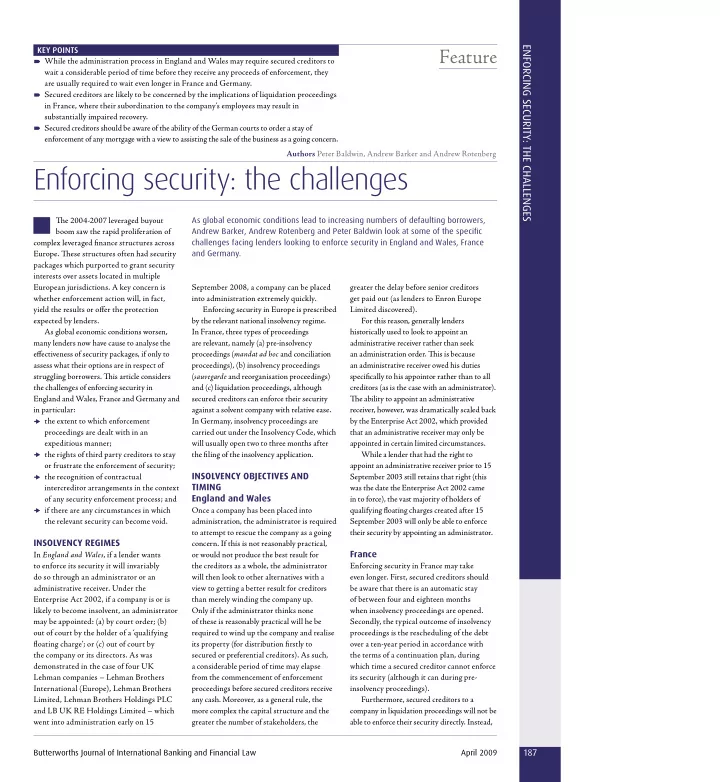

Butterworths Journal of International Banking and Financial Law is is because get paid out (as lenders to Enron Europe Limited discovered). For this reason, generally lenders historically used to look to appoint an administrative receiver rather than seek an administration order. Ti an administrative receiver owed his duties greater the number of stakeholders, the specifi cally to his appointor rather than to all creditors (as is the case with an administrator). Ti e ability to appoint an administrative receiver, however, was dramatically scaled back by the Enterprise Act 2002, which provided greater the delay before senior creditors more complex the capital structure and the appointed in certain limited circumstances. Only if the administrator thinks none to attempt to rescue the company as a going concern. If this is not reasonably practical, or would not produce the best result for the creditors as a whole, the administrator will then look to other alternatives with a view to getting a better result for creditors than merely winding the company up. of these is reasonably practical will he be any cash. Moreover, as a general rule, the required to wind up the company and realise its property (for distribution fi rstly to secured or preferential creditors). As such, a considerable period of time may elapse from the commencement of enforcement proceedings before secured creditors receive that an administrative receiver may only be While a lender that had the right to April 2009 in France, where their subordination to the company’s employees may result in company in liquidation proceedings will not be able to enforce their security directly. Instead, KEY POINTS While the administration process in England and Wales may require secured creditors to wait a considerable period of time before they receive any proceeds of enforcement, they are usually required to wait even longer in France and Germany. Secured creditors are likely to be concerned by the implications of liquidation proceedings substantially impaired recovery. insolvency proceedings). Secured creditors should be aware of the ability of the German courts to order a stay of enforcement of any mortgage with a view to assisting the sale of the business as a going concern. As global economic conditions lead to increasing numbers of defaulting borrowers, Andrew Barker, Andrew Rotenberg and Peter Baldwin look at some of the specifi c challenges facing lenders looking to enforce security in England and Wales, France and Germany. Furthermore, secured creditors to a its security (although it can during pre- appoint an administrative receiver prior to 15 Enforcing security in France may take September 2003 still retains that right (this was the date the Enterprise Act 2002 came in to force), the vast majority of holders of qualifying fl oating charges created after 15 September 2003 will only be able to enforce their security by appointing an administrator. even longer. First, secured creditors should which time a secured creditor cannot enforce be aware that there is an automatic stay of between four and eighteen months when insolvency proceedings are opened. Secondly, the typical outcome of insolvency proceedings is the rescheduling of the debt over a ten-year period in accordance with the terms of a continuation plan, during administration, the administrator is required Once a company has been placed into Authors Peter Baldwin, Andrew Barker and Andrew Rotenberg England and Wales, France and Germany and eff ectiveness of security packages, if only to assess what their options are in respect of struggling borrowers. Ti is article considers the challenges of enforcing security in in particular: As global economic conditions worsen, the extent to which enforcement proceedings are dealt with in an expeditious manner; the rights of third party creditors to stay or frustrate the enforcement of security; the recognition of contractual of any security enforcement process; and many lenders now have cause to analyse the expected by lenders. the relevant security can become void. complex leveraged fi 187 Feature ENFORCING SECURITY: THE CHALLENGES Ti e 2004-2007 leveraged buyout boom saw the rapid proliferation of nance structures across er the protection Europe. Ti ese structures often had security packages which purported to grant security interests over assets located in multiple European jurisdictions. A key concern is whether enforcement action will, in fact, yield the results or off if there are any circumstances in which intercreditor arrangements in the context went into administration early on 15 by the relevant national insolvency regime. Limited, Lehman Brothers Holdings PLC and LB UK RE Holdings Limited – which In England and Wales , if a lender wants September 2008, a company can be placed into administration extremely quickly. Enforcing security in Europe is prescribed In France, three types of proceedings Lehman companies – Lehman Brothers are relevant, namely (a) pre-insolvency proceedings ( mandat ad hoc and conciliation proceedings), (b) insolvency proceedings ( sauvegarde and reorganisation proceedings) and (c) liquidation proceedings, although secured creditors can enforce their security against a solvent company with relative ease. carried out under the Insolvency Code, which International (Europe), Lehman Brothers demonstrated in the case of four UK the company or its directors. As was ling of the insolvency application. to enforce its security it will invariably the fi do so through an administrator or an administrative receiver. Under the Enterprise Act 2002, if a company is or is likely to become insolvent, an administrator may be appointed: (a) by court order; (b) out of court by the holder of a ‘qualifying will usually open two to three months after fl oating charge’; or (c) out of court by In Germany, insolvency proceedings are Enforcing security: the challenges INSOLVENCY OBJECTIVES AND TIMING England and Wales INSOLVENCY REGIMES France
Recommend
More recommend